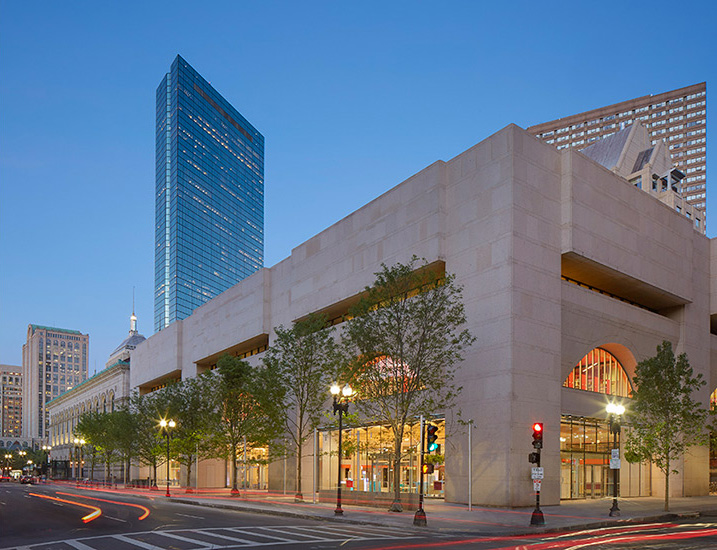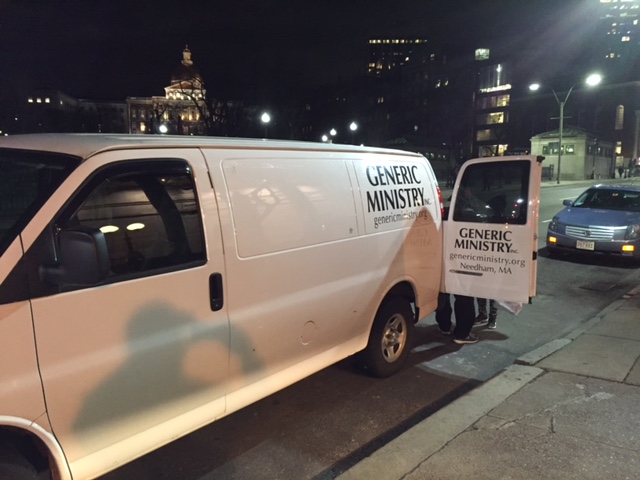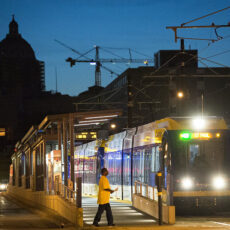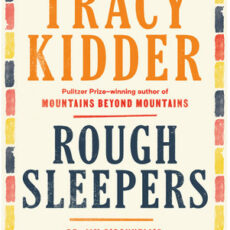The one line I remember from Tennessee Williams’ “A Streetcar Named Desire” is when Blanche says, “I have always depended on the kindness of strangers.” From my perspective, relying on a stranger, or on anyone, for that matter, seemed impossible, even dangerous. I was raised to be self-sufficient. And to believe in self-sufficiency.
Now, in my sixth decade of fending for myself very well thank you, I’m living on the streets of Boston without money or a credit card. I’ll need to rely on the kindness of strangers. Granted, I’m here of my own accord; I chose to participate in the Street Retreat. Still, this vulnerability is a shock to my system. For several years I’ve practiced surrendering to the best of my ability, my grip loosening only slightly. Now, as if on a dare, I’m stretching out an open hand, wondering what will happen.
On this first evening of living on the streets, the church we’d understood to be serving free meals remains dark with locked doors. Peter, one of my companions on the retreat, enters a restaurant to ask for food. He rejoins us, empty-handed. I find myself following him into the next restaurant. No luck at that one, nor at the third. At a take-out Mexican restaurant I explain to the young man at the counter that we are living on the streets and wondering if he has extra food to offer. He turns to the woman standing next to him – likely his madre – and after speaking to each other in low voices in Spanish, he says, sorry, no. They do usually help, but later in the evening, after the dinner hour. I thank them and we walk back onto the street, wondering if we’ll have to skip dinner. A voice calls out from behind us, and we turn to see the young man from the Mexican restaurant. “Do you like watermelon juice?” Although the temperature is in the 70s, the air is thick with humidity. Oh yes, we would LOVE watermelon juice! Peter and I follow him into the restaurant. He pulls two tall cups of juice from the refrigerator, stirs the juice and hands us the cups with a smile. Muchas gracias. Adhering to the agreement that anything we receive as an individual will be shared with the group, Peter and I with no little excitement deliver the watermelon juice to the group. We all take turns sipping, the cups quickly emptying.

Entering a restaurant and asking for free food instead of a table is definitely awkward. And, depending on the response, also humiliating. On this first evening of the retreat my clothes are still clean. I look very much like a patron. The friendly expectancy on the face of the greeter instantly shifts to an expression of confusion, concern and sometimes irritation. Our mistake of asking for food during the busy dinner hour becomes obvious. Still, I feel grateful for the experience of asking and feeling no anger or judgment toward those who denied me. I’ve lost nothing by asking. However, if I hadn’t eaten in several days, would I be as quick to smile and say, “Thanks anyway”?
As I stand on the corner at a busy intersection with my seven companions, wondering about next steps, a young woman with a bright smile recognizes Bushin, our co-facilitator who is enrolled at Harvard Divinity School. They share hugs and happily chatter. When she learns about our retreat and our predicament, the woman extracts $50 from a nearby ATM and hands the money to Bushin. As a group, we decide that Trader Joe’s would be the most affordable venue. We roam the aisles, searching for food that would provide the most nutrition for the least amount of money, While Mike, a professor on sabbatical from Colorado State, stands in the checkout line with a filled basket, the other Wendy (a physician) and I search for utensils. Trader Joe’s is out of knives. We’ll have to use a plastic spoon to spread the peanut butter. I’m reminded of the adjustments made on camping trips and comforted by the familiarity of this workaround.

On the sidewalk in front of the contemporary addition to Boston Central Library, we sit in a circle and spread out our food in the center: gorp of two kinds, peanut butter, Ezekiel bread, apples, hummus, a bag of sweet peppers. Wendy uses the spoon to slather peanut butter on slices of bread for us. As we share a meal that feels even more like a gift than usual, a white van with the words “Generic Ministry” pulls up to the curb. Within minutes a line of people forms at the back of the van, its doors open, the lights from within shining into the darkness of the night. I have no timepiece. It’s been dark for at least an hour. Bright lights from the library beam down on us – the urban version of picnicking under the light of a full moon.

My belly full, I’m feeling no want aside from a toothbrush. One of my concerns about the Street Retreat is the fur that will thicken on my teeth over the course of four days of not brushing my teeth. When the last person in line at the Generic Ministry van walks away with a plastic bag stuffed with clothing and supplies, I approach the van. A lumpy-faced middle-aged man greets me with a huge smile. I ask if they have toothbrushes and toothpaste. Yes! He apologizes, says he didn’t realize we were living on the streets, and invites me to the back of the van where another volunteer can help me. Along the left wall of the van are shelves of clothing, and along the right wall are small bins containing items that might be helpful for people living on the streets. But no floss. A thin, wiry woman, who appears to be my age and is adept at maneuvering in the cramped space, hands me a toothbrush and a small tube of Crest and asks me what else I need. Turkey sandwich? No, thanks, I’m vegetarian. I settle for packets of moist towelettes.
My needs today were met, thanks to the kindness of strangers. The generosity I’ve experienced gently corrects the false narrative of self-sufficiency. The truth is that I’ve lived a comfortable life, always sheltered and never hungry, because of the generosity of others and the privileges that come with being White, intelligent and middle-class. I was born with a get-out-of-jail-free card. I’ve made foolish, even dangerous choices that caused great suffering to myself and others. Without the safety net I was born into, I could easily have ended up living on the streets. Maybe this Street Retreat is an invitation into deeper gratitude for all of the generosity that’s come my way, especially the generosity I didn’t appreciate at the time.


